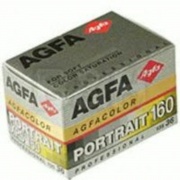Difference between revisions of "Agfacolor"
Jump to navigation
Jump to search
| (One intermediate revision by the same user not shown) | |||
| Line 4: | Line 4: | ||
[Agfa, Ger.] A registered trademark originally used for color photographic plates manufactured in Berlin in 1916. Agfacolor® plates were made with tiny dyed grains of [[gum arabic]] or [[shellac]]. The fine-grains gave an intense color. Agfacolor® grain sheets were introduced as rolls and sheets in 1932. A slide film, called Agfacolor® Neu (or Agfacolor® new) was introduced in 1936. It uses the subtractive color process to produce color negatives. Agfacolor® printing paper that used a multilayer negative-positive process was introduced in 1942. | [Agfa, Ger.] A registered trademark originally used for color photographic plates manufactured in Berlin in 1916. Agfacolor® plates were made with tiny dyed grains of [[gum arabic]] or [[shellac]]. The fine-grains gave an intense color. Agfacolor® grain sheets were introduced as rolls and sheets in 1932. A slide film, called Agfacolor® Neu (or Agfacolor® new) was introduced in 1936. It uses the subtractive color process to produce color negatives. Agfacolor® printing paper that used a multilayer negative-positive process was introduced in 1942. | ||
| − | == | + | ==Resources and Citations== |
| − | * | + | * Luis Nadeau, ''Encyclopedia of Printing, Photographic, and Photomechanical Processes'', Atelier, New Brunswick, 1997 |
| − | * Wikipedia | + | * Wikipedia at http://en.wikipedia.org/wiki/Agfacolor (Accessed Mar. 1, 2006) |
[[Category:Materials database]] | [[Category:Materials database]] | ||
Latest revision as of 14:37, 24 April 2022
Description
[Agfa, Ger.] A registered trademark originally used for color photographic plates manufactured in Berlin in 1916. Agfacolor® plates were made with tiny dyed grains of Gum arabic or Shellac. The fine-grains gave an intense color. Agfacolor® grain sheets were introduced as rolls and sheets in 1932. A slide film, called Agfacolor® Neu (or Agfacolor® new) was introduced in 1936. It uses the subtractive color process to produce color negatives. Agfacolor® printing paper that used a multilayer negative-positive process was introduced in 1942.
Resources and Citations
- Luis Nadeau, Encyclopedia of Printing, Photographic, and Photomechanical Processes, Atelier, New Brunswick, 1997
- Wikipedia at http://en.wikipedia.org/wiki/Agfacolor (Accessed Mar. 1, 2006)
